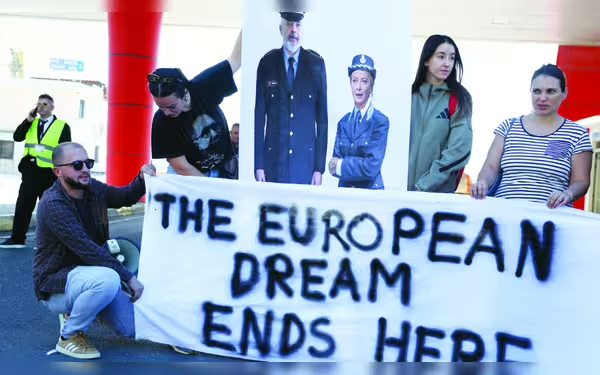Monday, December 23, 2024 05:49 AM
Italy-Albania Migration Agreement Sparks Ethical Controversy
- Humanitarian groups criticize Italy-Albania migration deal.
- Agreement raises serious medical ethics concerns.
- Only 20 migrants transferred to Albania so far.
 Image Credits: arabnewspk
Image Credits: arabnewspkThe Italy-Albania migration agreement faces backlash from humanitarian groups over ethical concerns and inadequate protections for migrants.
In recent times, the issue of migration has become a focal point of discussion across Europe, particularly in Italy. The Italian government, led by Premier Giorgia Meloni, has been actively seeking solutions to manage the influx of migrants arriving from North Africa. One of the most controversial measures has been the migration agreement with Albania, which has drawn sharp criticism from various humanitarian organizations.
This agreement aims to process the asylum cases of certain male migrants who are rescued at sea while they are detained in holding centers in Albania, a country that is not part of the European Union. The Italian government has touted this deal as a model for Europe, claiming it will deter potential refugees from embarking on perilous journeys across the Mediterranean Sea. However, the deal, which is budgeted to cost Italy €670 million (approximately $730 million), has faced numerous legal challenges and construction delays, preventing any migrants from being processed in Albania thus far.
Humanitarian organizations, including Doctors Without Borders and Sea-Watch, have voiced their concerns, stating that the agreement violates medical ethics and human rights. They argue that the procedures in place to determine whether migrants are “vulnerable” are inadequate and that many individuals who attempt the dangerous crossing have already suffered significant trauma. The groups emphasize that migrants should be recognized as at risk of severe physical and mental health issues, including post-traumatic stress disorder.
In a statement, these organizations declared, "The Italy-Albania Protocol violates the code of medical ethics and human rights and puts the physical and psychological health of migrants at risk." They have also criticized international organizations involved in the project, claiming that they are complicit in human rights violations. The Knights of Malta, one such organization, has strongly denied these allegations, asserting that their medical teams have been providing essential first aid to migrants at sea since 2008 and have not participated in the selection or transfer of migrants to Albania.
Despite the Italian government's assurances that the rights of migrants will be fully protected in the Albanian centers, human rights advocates remain skeptical. They argue that the agreement sets a dangerous precedent and undermines Italy's obligations under international law. The European Commission has endorsed the deal, with President Ursula von der Leyen describing it as an example of "out-of-box thinking" to address the migration crisis.
As the situation unfolds, the UN refugee agency has agreed to oversee the initial three months of the agreement, conducting an independent mission to monitor the screening process on board the transfer ship. However, the legal challenges continue to mount, and the number of migrants affected remains alarmingly low, with only 20 individuals transferred to Albania so far.
The Italy-Albania migration agreement raises significant ethical and legal questions that cannot be overlooked. As Europe grapples with the complexities of migration, it is crucial to prioritize the rights and well-being of those seeking refuge. The ongoing debate highlights the need for a balanced approach that respects human dignity while addressing the challenges posed by migration. The voices of humanitarian organizations must be heard, as they advocate for a more humane and ethical response to one of the most pressing issues of our time.













